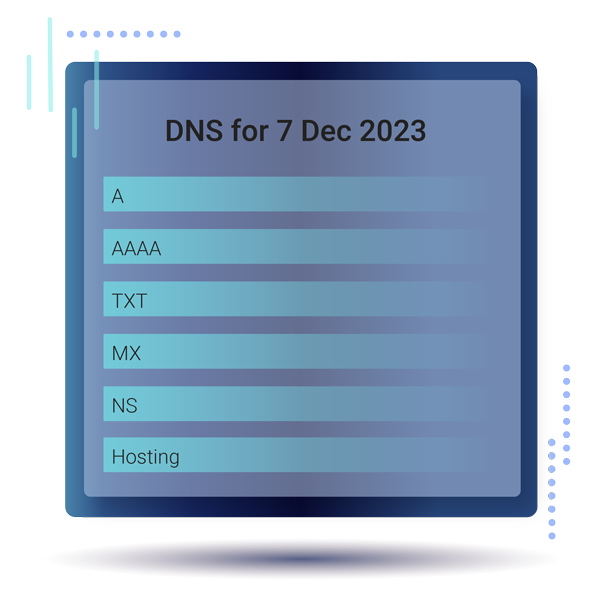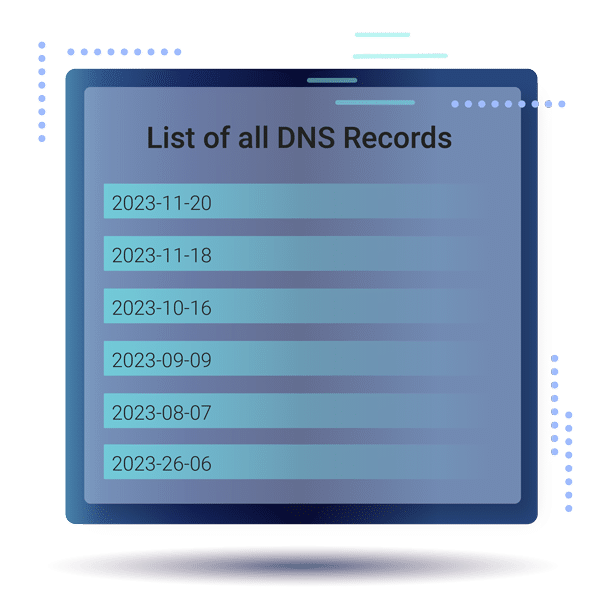DNS data lookup tool
DNS DATA
Comprehensive DNS information for any and all domain names

DNS data lookup tool provides real-time insights into IP addresses, domain records, and authoritative server information. These insights are crucial for security analysis and understanding the overall infrastructure of the internet. By analyzing DNS data, researchers can identify potential problems, track changes to domain names, and monitor the overall health and status of a domain.
DATA POINTS
IPv4 (A record)
IPv6 record (AAAA)
TXT records
Mail Exchanger (MX)
Name Servers (NS)
Start of Authority
Cannonical name (CNAME)
DNSSEC
Autonomous System Number (ASN)
Hosting information

View the DNS records for every domain name
This feature allows you to view all the DNS records for a domain name. This can be helpful for understanding how a website is configured. The DNS records will show you the IP address of the website, the mail and name servers, TXT records, AS number, hosting, DNSSEC etc.
– Leverage DNS data to enhance your understanding of web properties, effectively mitigating risks and vulnerabilities.
– Monitor configurations and detect potential anomalies in DNS records of third-party suppliers or partners.
– Utilize attackers’ or suspected actors’ IP addresses for reverse IP searches, unveiling insights into their infrastructure and identifying previously unknown web properties that may pose threats.
Conduct the Reverse DNS Lookup
Reverse DNS lookup allows users to find domain names that are associated with a certain DNS record, be it IP address, MX, NS, or other record. Use Reverse DNS lookup to uncover domain names that might be a part of one network or have a common owner. This can be helpful for identifying spam or phishing emails. Employ our reverse MX lookups to scrutinize an organization’s email infrastructure, gaining valuable insights into its network architecture and identifying potential security vulnerabilities. Uncover potentially malicious mail servers and connected web properties for a comprehensive security assessment.
– Reveal associations among domains that might initially appear unrelated to security threats.
– Ensure the isolation of your IP address by accessing a list of domains sharing the same IP.
– Utilize our reverse NS lookup to trace domain associations within your company that might have gone unnoticed.


Check DNS History
This feature allows you to view the DNS history for a domain name. This can be helpful for tracking changes to a domain name’s DNS records over time. You can use this information to identify potential problems with a domain name, such as if it has been hijacked.
– Conduct a comprehensive audit of all web properties to ensure none are associated with malicious domains, safeguarding your brand reputation.
– Keep tabs on domains sharing nameservers, identifying potential blockages that could adversely impact your domain reputation and website accessibility.
– Identify indicators of compromise and related artifacts, even if undisclosed publicly.
– Discover and secure abandoned or forgotten web properties to prevent compromise and threats like website defacement.
– Utilize DNS and IP history records to determine if you share IP hosts with vulnerable websites.
AREAS OF APPLICATION

Tracking over 1.4 billion both registered and unregistered domains.

Storing 80 billion historical records since 2011.

Updating WHOIS records
every 45 days

Covering 99.5% of all generic and country-code top-level domain names.

